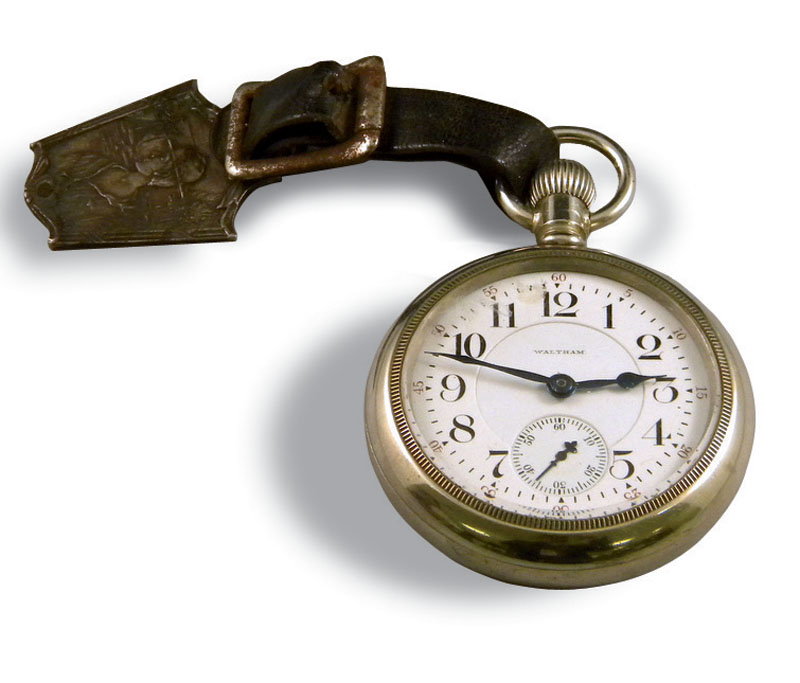Waltham Pocket Watches | Antiques & Collectibles
If you ask someone for the time these days, you’ll likely find that instead of checking his wrist, he reaches into a pocket and flips open his cell phone. The gesture seems thoroughly modern, but it’s actually nostalgic. Because more than 100 years ago, before the wristwatch was ever invented, time and its keeper were […]

From 1852 to 1957, Waltham produced more than 40 million of the highest-quality pocket watches.
Photo Credit : courtesy of Skinner, Inc.
Photo Credit : courtesy of Skinner, Inc.
If you ask someone for the time these days, you’ll likely find that instead of checking his wrist, he reaches into a pocket and flips open his cell phone. The gesture seems thoroughly modern, but it’s actually nostalgic. Because more than 100 years ago, before the wristwatch was ever invented, time and its keeper were held precious, tucked away, close to the body. To reveal them required that now-familiar reach into one’s clothing and the flip of a cover. I’m referring of course to the pocket watch, and some of the finest examples were made by the Waltham Watch Company in Waltham, Massachusetts.
Timekeeping reaches back to the sundial of the ancient Egyptians and Babylonians. By the Middle Ages, the mechanical clock had been invented, but the pocket watch didn’t really exist until the 1600s. Until the mid-19th century, watches were made like other artisanal goods, with most parts being fashioned one at a time, then assembled, to make an individual timepiece.
David Davis, Edward Howard, and Aaron Dennison turned watchmaking on its head in the 1850s when they developed a plan for manufacturing their products on an assembly line with 100 percent interchangeable parts, a method based on the mass production of clocks, rifles, and other precision goods that had begun at the dawn of the 19th century and would finally be fully embraced during the Civil War. Their collaboration would later become the Waltham Watch Company, maker of the first-ever mass-produced watches. Waltham established the “American System of Watch Manufacturing,” a patented process that would eventually be adopted by Swiss clock- and watchmakers. From 1852 to 1957, Waltham produced more than 40 million of the highest-quality pocket watches (and other precision instruments such as clocks, speedometers, compasses, and timed fuses).
Like many industry pioneers, the company followed a crooked path of success and failure. Founded in Roxbury, Massachusetts, as the American Horologe Company, it moved to Waltham in 1854 and underwent a series of bankruptcies, mergers, and name changes, including Warren Manufacturing Co., Boston Watch Company, Appleton Tracy & Co., American Watch Company, American Waltham Watch Company, and finally Waltham Watch Company in the early 1900s. Many Waltham-made pocket watches bear these earlier company names. The very best items were made between 1859 and 1915 and are often labeled American Watch Company.
I asked Melissa Riebe of Skinner’s Discovery Department what makes Waltham pocket watches so popular among collectors. “Their exquisite cases and high-quality construction are a cut above those of other watches,” she explained. “Some can be very elaborate, made of silver or tricolored gold, with engraved floral, scroll, abstract, or monogram designs. Men’s pocket watches are typically larger than women’s, which were often designed to be worn suspended from a chain as a pendant or fastened to a brooch. They’re as functional as they are beautiful, and with proper care and cleaning, keep excellent time.”
Most Waltham pocket watches sell for $100 to $2,000 at auction, depending on condition, age, case design, and whether they run. Early watch models are in higher demand, given that very few were made, so look for items bearing serial numbers lower than 180,000 (inside the case on the movement). Make sure the watch runs in any position: face up, face down, or when you hold it vertically.
Despite their beautiful cases, great works, and that satisfying tick-tick-tick, pocket watches probably won’t make a comeback. But the idea of holding onto the hours in one’s pocket? Now that has timeless appeal.
Catherine Riedel represents Skinner Auctioneers and Appraisers of Boston and Marlborough, Massachusetts. 617-350-5400, 508-970-3000; skinnerinc.com


